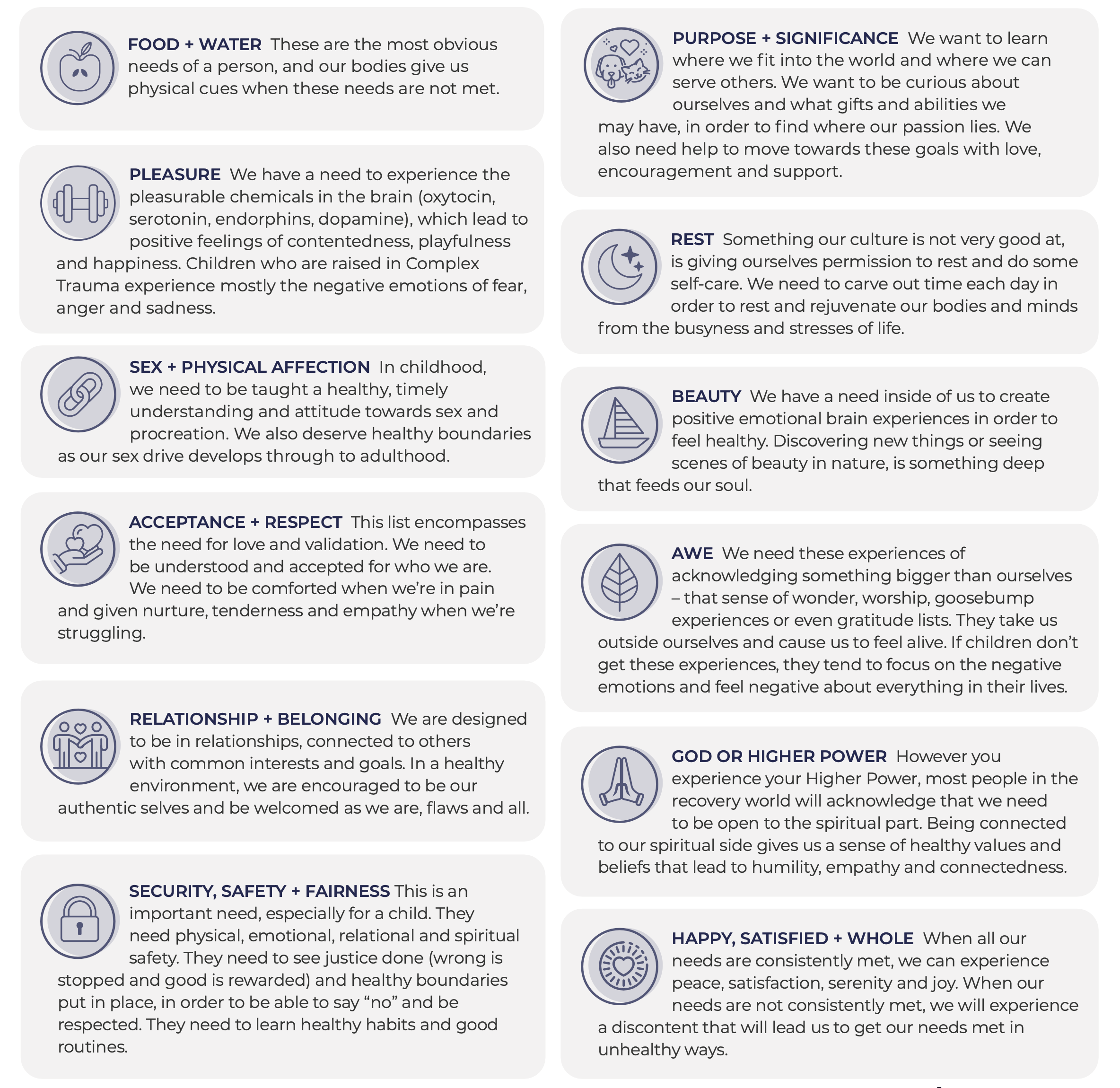
HEALING FROM COMPLEX TRAUMA AND UNCOVERING YOUR 12 BASIC NEEDS CAN TRANSFORM YOUR LIFE
Uncover the needs that have been neglected due to Complex Trauma and start your path towards a balanced and fulfilled life today.
Imagine a life where your basic needs are finally being met in a healthy way.
If you’ve experienced Complex Trauma, you may feel stuck, overwhelmed, or disconnected. The truth is: trauma often disturbs our natural cycle of fulfilling essential needs—leaving us feeling empty, anxious and lost. But, healing is possible. In this course, we’ll explore the 12 Basic Needs that are crucial for emotional and physical well-being, and show you how to restore balance so you can start living your life to the fullest.
We have identified that all humans were born with 12 Needs to achieve homeostasis or a balanced life.
What are the 12 Basic Needs?
This introductory course is your first step toward healing. Whether you’re just beginning to understand Complex Trauma or you’re seeking practical tools to restore balance, this course will guide you through the 12 Basic Needs and show you how to reconnect with them.
Course Overview

The ALIGN With Your Needs Self-Study course is a wonderful and gentle way to introduce yourself to Complex Trauma and your 12 Basic Needs, which are essential for healing.
Course Highlights
Affordable pricing: Available for 6 Payments of $75.00 - gain access to life-changing tools at your own pace
52 Lessons: A comprehensive breakdown of the 12 Basic Needs and their connection to Complex Trauma.
Choose Your Path: Go at your own pace or join our Community Space to connect with others who understand your journey.
Group Coaching Sessions: Take your learning deeper with Group Coaching Sessions, hosted by our trained facilitators. These optional sessions provide community support and offer you the opportunity to engage with others who are on the same healing path.
Course Curriculum
-
How to Use This Course
Questionnaire: Before We Begin
Questionnaire: Recognizing Complex Trauma
-
Lesson
Many people with complex trauma grew up feeling unseen and misunderstood, unsure of how to meet their needs in healthy ways. This module introduces the 12 core human needs—physical, emotional, and spiritual—and shows how unmet needs shape our identity, coping, and attachment. You'll begin to understand the root of your patterns and lay the foundation for the rest of the course.
-
Introduction • Lessons • Video
For many trauma survivors, even basic needs like food, shelter, or rest were surrounded by shame, unpredictability, or unmet expectations. This module explores how early experiences with food, water, hygiene, housing, healthcare, and education shape our identity, coping strategies, and self-worth. You'll begin to reframe your relationship with these foundational needs and learn how to meet them with compassion, clarity, and consistency.
-
Introduction • Lessons • Video
If pleasure was discouraged, shamed, or tied to unhealthy coping in childhood, it can feel confusing or even unsafe to enjoy life’s simple joys. This module explores how trauma disrupts our relationship with pleasure—physically, emotionally, and relationally—and guides you in distinguishing healthy enjoyment from harmful escape. You'll begin to reconnect with pleasure as a vital, nourishing part of healing and wholeness.
-
Introduction • Test • Lessons • Video
Many people with complex trauma were never taught how to safely navigate the world of intimacy, often receiving shame or silence instead of support. In this module, you'll explore how distorted experiences around sex and affection form, how to set healthy boundaries, and how to reparent your inner self through compassion, clarity, and connection. By the end, you’ll begin building a respectful, grounded relationship with your body, your needs, and others.
-
Introduction • Lessons • Video
Growing up, many people received love only when they conformed, leaving them with the belief that they weren’t truly accepted or understood. This module helps uncover how conditional love, criticism, shame, and emotional neglect erode self-worth—and how to rebuild it through self-compassion, boundaries, and authentic identity. You'll begin learning to treat yourself with the same respect and kindness you needed all along.
-
Introduction • Lessons • Video
Humans are designed to be in relationships, but for many of us, we weren’t given a framework for building healthy relationships. In this module, you’ll learn about the different levels of relationships, how this need was not met in your childhood, and how to begin forming healthy relationships in the future.
-
Introduction • Lessons • Video
We all long to feel safe, secure, and treated fairly, yet trauma often distorts how we understand and experience these needs. In this module, you’ll explore how a lack of safety shapes the brain and relationships, and then learn practical tools and boundaries for re-establishing stability and fairness in your life. By the end, you’ll be equipped to create a stronger sense of protection and justice for yourself, fostering healthier choices and relationships.
-
Introduction • Lessons • Video
Many people struggle to know who they are or why they matter, especially when early life lacked encouragement or guidance. In this module, you’ll uncover how trauma can distort your sense of purpose, and learn practical ways to rediscover your passions, set healthy boundaries, and nurture your unique identity. By the end, you’ll be equipped to build a life with clarity, direction, and meaningful contribution.
-
Introduction • Lessons • Video
Many of us grew up believing rest was lazy or unsafe, leaving us stuck in cycles of busyness, guilt, or burnout. In this module, you’ll uncover how trauma distorts the ability to rest, explore the five types of rest, and learn practical boundaries for creating safety and renewal. By the end, you’ll be able to restore balance between work and rest, fueling deeper peace, resilience, and connection.
-
Introduction • Lessons • Video
When life feels heavy or chaotic, it’s easy to miss the beauty that restores joy and wonder to our souls. In this module, you’ll discover how trauma distorts our ability to see and value beauty, and learn practical ways to reclaim it through self-compassion, creativity, and connection with nature and art. By the end, you’ll be equipped to invite beauty back into your daily life, bringing healing, inspiration, and hope.
-
Introduction • Lessons • Video
In the chaos of trauma, many lose the ability to feel wonder, leaving life flat, heavy, or disconnected. In this module, you’ll explore how awe nurtures gratitude, balances the nervous system, and connects you to something greater than yourself, then learn practical ways to reparent this need through creativity, nature, spirituality, and new experiences. By the end, you’ll be equipped to reawaken a sense of wonder that restores joy, healing, and perspective.
-
Introduction • Lessons • Video
For many with trauma, spirituality can feel confusing, unsafe, or distorted by fear and control. In this module, you’ll explore how early experiences shape your view of spirituality, and learn practical tools for setting healthy boundaries, reframing harmful beliefs, and safely reconnecting with spirituality on your own terms. By the end, you’ll be able to approach this need with curiosity and authenticity, opening the door to deeper meaning, hope, and connection.
-
Introduction • Lessons • Video
Most of us long to feel whole and at peace, but trauma often leaves us with unmet needs, shame, and disconnection from ourselves. In this final module, you’ll learn how boundaries, reparenting, and love help restore each of the 12 basic needs, and explore how healing shame transforms your sense of self. By the end, you’ll be equipped with practical tools to feel safe, grounded, and authentically fulfilled in daily life.
It’s time to reclaim your life.
The 12 Basic Needs are waiting for you to discover them. With trauma, we often feel broken, misunderstood, or disconnected. But you don’t have to stay stuck. By understanding these core needs, you can take control of your healing journey, find inner peace, and start living a more fulfilling life.
ALIGN FAQs
-
The ALIGN courses are a set of online courses created by Tim Fletcher and his team to help people better understand themselves, their needs, their faith, and their relationships. The courses are designed for adults who want to grow in emotional awareness, healing from complex trauma, recovery from addiction, healthier connection, and personal alignment.
Some courses are also specifically created for parents who want to better understand and support their children. The curriculums are educational, reflective, and accessible, whether you are early in your healing journey or continuing long-term growth. -
Yes. All ALIGN courses are offered fully online and can be accessed from anywhere in the world, including Canada, the United States, and internationally. Once you enroll, you receive ongoing access to the course materials, allowing you to move through the content at your own pace and return to it as needed. This flexible format is designed to support learning, reflection, and integration over time, rather than rushing through the material.
-
No — our ALIGN courses have been developed as a place to begin your healing journey. You can do one course or many, and it does not matter in which order. However, we do recommend starting with ALIGN With Your Needs. You might also want to try some of our bite-sized Evergreen courses first.
-
Our ALIGN courses have all been developed to be gentle, self-paced ways to step into your healing journey from complex trauma. They are intended to be self-guided, so most ALIGN courses do not include group sessions.
Our ALIGN With Your Needs course holds optional bi-weekly group sessions, and our ALIGN With God course has monthly, publicly available webinar lessons. These are accessible within the safe communities for those courses.
Our ALIGN courses do not grant access to one-on-one coaching with our team. Send us an inquiry if you’d like to learn how to get one-on-one coaching.
-
When you enroll for an ALIGN course, you get indefinite access to the course materials, as long as you have your Thinkific account.
You also get access to that course’s Community page within Thinkific.
-
Our courses are hosted through Thinkific. Log into Thinkific and go to your Dashboard to see all of your active enrollments.
If you have any issues accessing your courses, reach out at contact@timfletcher.ca.
-
You will gain indefinite access to the ALIGN course materials as long as you have your Thinkific account.
-
Yes! During checkout, check the “This is a Gift” box and Thinkific will prompt you to enter the recipient’s information.
-
No, our courses and programs are not accredited. They have been developed as an affordable and gentle way to begin learning about and recovering from complex trauma and its characteristics.
-
Every module includes a video, reading materials, and activities to work through.
-
Our ALIGN courses are self-paced and self-study only, so you can get started right away. You will be working through lessons, watching videos, and working through exercises.
-
If you’d like a more interactive and comprehensive experience, we encourage you to explore our LIFT Live Online Learning Program.
If you’re looking for more guidance, book an Intake Session with us! Our team will be happy to get to know you and make program recommendations.
-
No! You do not have to go through any ALIGN courses to join the LIFT program.
-
Our courses and programs are online-only and hosted through the Thinkific learning platform. You can access them through your computer, tablet, or smart phone. We recommend using a computer or tablet for the best experience.
-
No. All of our courses and programs are education, not therapy.
Our online programs are focused on psychoeducation to provide understanding and awareness about complex trauma. Our main purpose is to provide people with the tools, literacy and agency to heal through loving coaching and facilitation. They are tools best used alongside care from a licensed professional.
-
If you still have more questions about our courses and programs, reach out to us at contact@timfletcher.ca!
-
The ALIGN Self Study courses have been made available for purchase on a 6-month payment plan to help ease the financial pressure of purchasing the course as a whole in a one-time payment.
This is not to be treated as a course subscription as you will receive access to the course material after the payment plan has been fulfilled.
Cancellation requests must be made within 45 days of the purchase date. Refunds may be requested, excluding the first months payment.
Trauma is not what happens to you. Trauma is what happens inside you as a result of what happens to you. - Gabor Maté
Our programs and training environments encourage participants to look at early childhood environments with a different type of lens; not only focusing on seemingly obvious, (largely traumatic) events, but on all of the pieces that may have played a role. We investigate biological, psychological, social and spiritual factors with a measure of curiosity, compassion and love. By examining the entire picture, we are able to see that several aspects of early childhood can be traumatic, resulting in shame-based identity development, unsound coping adaptations, and unhealthy relationship attachments.
We’re here to safely connect with, and explore that journey of discovery - together!




